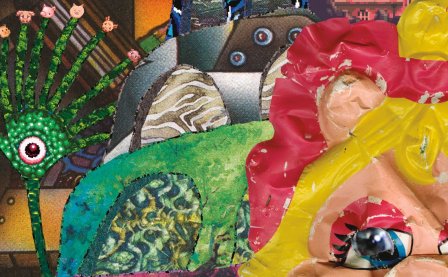Taken at face value, without any subtext or backstory, the electronic noise signifiers that slam into your psyche while listening to Kill Alters have the potential to terrify. Peals of atonal synth, howled vocal hysterics, and overdriven beats battle for space in maxed-out mixes that continue to escalate just as you thought they had reached their limit. Sink too deep into their debut Kill Alters and you’ll feel the seams of your mind stretching under the weight of repeated static transgressions carried out by Bonnie Baxter (who also performs as Shadowbox) and her collaborators.
The contributions of another absent collaborator, however, elevate the project to unexpected heights of multimedia mind demolition: Baxter’s mother, present here both as a disembodied voice within the chaos and as an inspiration for Baxter’s lyrics and vocal delivery. Baxter fleshed out Kill Alters as she digitized over 40 years of cassette tapes recorded by her mother, which document everything from candid conversations to manic episodes stemming from her Tourette’s and obsession compulsive disorder. Over whirring expanses of drone, we hear Baxter and her mother engage in a call-and-response series of laughs and screams (“I’m Laughing”) or share grim recollections of abuse (“My Father”). But Baxter herself, in the present day, purveys enough sonic insanity from her synths and vocal cords to match the power of her past-sourced supplements. Numbered tracks like “A09,” “D15,” and “D20” highlight her dynamic vocal delivery, which flits between childish song song melodies, stretched moans, and unhinged roars that illustrate the acknowledged influence of Mike Patton.
While many noise projects interlace spoken word interludes and found sounds into their screeching amalgamations, Baxter’s decision to showcase the details of her personal history and family life imbue each Kill Alters session with a sense of unfiltered catharsis — much closer to home than, say, recordings of fiery religious sermons or rants sourced from Youtube. As Baxter’s collection of raw source material from her mother expanded, lost pieces of her upbringing faded back into view: forgotten places the family lived together, forgotten conversations, forgotten routines. In this sense, Baxter’s compositional process of historical curation provides the only degree of separation from her reforming memories and our discovery of those memories. We glean some sliver of her life from a vantage point a few paces behind her.
• Kill Alters: https://www.youtube.com/user/killalters
• GODMODE: http://entergodmode.tumblr.com
More about: Kill Alters

